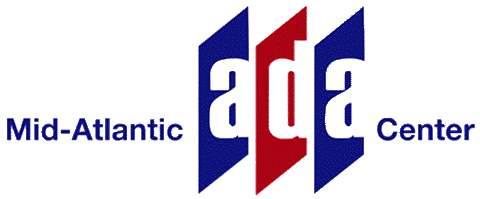(Printer-friendly PDF version | 108 KB)
(Large-print PDF | 210 KB)
(Versión en español)
The Department of Justice has issued revised ADA regulations which cover Title II (state and local government programs) and Title III (places of public accommodation, such as restaurants or retail merchants) , which took effect March 15, 2011. These regulations revise the definition of service animal and add additional provisions.
Definition
A service animal is any dog that is individually trained to do work or perform tasks for the benefit of an individual with a disability, including a physical, sensory, psychiatric, intellectual, or other mental disability. Other species of animals, whether wild or domestic, trained or untrained, are not considered service animals.
The work or tasks performed by a service animal must be directly related to the individual’s disability. Examples of work or tasks include, but are not limited to:
- Assisting individuals who are blind or have low vision with navigation and other tasks.
- Alerting individuals who are deaf or hard of hearing to the presence of people or sounds.
- Providing non-violent protection or rescue work.
- Pulling a wheelchair.
- Assisting an individual during a seizure.
- Alerting individuals to the presence of allergens.
- Retrieving items such as medicine or the telephone.
- Providing physical support and assistance with balance and stability to individuals with mobility disabilities.
- Helping individuals with psychiatric and neurological disabilities by preventing or interrupting impulsive or destructive behaviors.
The crime deterrent effects of an animal’s presence and the provision of emotional support, well-being, comfort, or companionship are not considered work or tasks under the definition of a service animal.
When and Where a Service Animal is Allowed Access
Individuals with disabilities can bring their service animals in to all areas of public facilities and private businesses where members of the public, program participants, clients, customers, patrons, or invitees are allowed. A service animal can be excluded from a facility if its presence interferes with legitimate safety requirements of the facility (e.g., from a surgery or burn unit in a hospital in which a sterile field is required).
A public entity or a private business may ask an individual with a disability to remove a service animal if the animal is not housebroken or is out of control and the individual is not able to control it. A service animal must have a harness, leash or other tether, unless the handler is unable to use a tether because of a disability or the use of a tether would interfere with the service animal’s ability to safely perform its work or tasks. In these cases, the service animal must be under the handler’s control through voice commands, hand signals, or other effective means. If a service animal is excluded, the individual with a disability must still be offered the opportunity to obtain goods, services, and accommodations without having the service animal on the premises.
Asking Questions
To determine if an animal is a service animal, a public entity or a private business may ask two questions:
- Is this animal required because of a disability?
- What work or task has this animal been trained to perform?
These questions may not be asked if the need for the service animal is obvious (e.g., the dog is guiding an individual who is blind or is pulling a person’s wheelchair). A public entity or private business may not ask about the nature or extent of an individual’s disability or require documentation, such as proof that the animal has been certified, trained or licensed as a service animal, or require the animal to wear an identifying vest.
Miniature Horses
A public entity or private business must allow a person with a disability to bring a miniature horse on the premises as long as it has been individually trained to do work or perform tasks for the benefit of the individual with a disability. However, an organization can consider whether the facility can accommodate the miniature based on the horse’s type, size, and weight. The rules that apply to service dogs also apply to miniature horses.
Other Provisions
- A public entity or private business is not responsible for the care and supervision of a service animal.
- A public entity or private business cannot ask nor require an individual with a disability to pay a surcharge or deposit, even if people accompanied by pets are required to pay such fees.
- If a public entity or private business normally charges individuals for the damage they cause, an individual with a disability may be charged for damage caused by his or her service animal.
Relationship to Other Laws
These provisions related to service animals apply only to entities covered by the ADA. The Fair
Housing Act covers service animal provisions for residential housing situations, and the Air Carrier Access Act covers service animal provisions for airline travel. The definition of a service animal under each of these laws is different from the definition under the ADA.
|
Content was developed by the Mid-Atlantic ADA Center, and is based on professional consensus of ADA experts and the ADA National Network. |
|
|
TransCen, Inc. |
The contents of this factsheet were developed under grants from the National Institute on Disability, Independent Living, and Rehabilitation Research (NIDILRR grant numbers 90DP0089 and 90DP0086). NIDILRR is a Center within the Administration for Community Living (ACL), Department of Health and Human Services (HHS). The contents of this factsheet do not necessarily represent the policy of NIDILRR, ACL, HHS, and you should not assume endorsement by the Federal Government. |
|
© Copyright 2017 ADA National Network. All Rights Reserved. |
|

.png)





